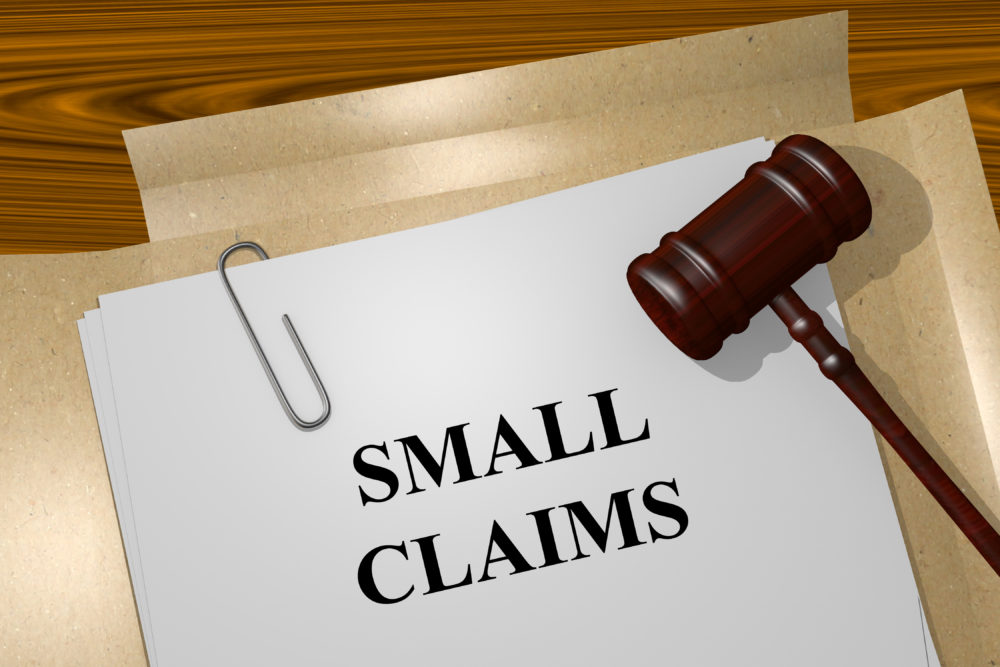If your business is owed money, then as long as it is less than £10,000, you can use the small claims court to recover what is owed to you.
Part of the county court, the small claims court was originally created to enable a layperson (ie someone who is not legally qualified) to take another individual to court.
The process is relatively simple, and you can do it yourself; you don’t need to engage a solicitor to help you.
Amanda Hamilton, chief executive of the National Association of Licenced Paralegals advises that there are fees involved, so make sure you consider this before you take action.
For example, when you file the claim there will be a fee to pay (this is dependent on the size of the claim), and then should a hearing be required and/or bailiffs to seize goods, further fees will be payable. ‘In most cases these fees can be added to your claim – but, in our experience they are seldom recovered, even if the initial debt is paid,’ Hamilton says.
“You can action the process without the help of a solicitor – saving you any legal fees”
If you do decide to take the small claims route then the very first action is to write the other party a letter. ‘This should clarify why they owe you money, including all the evidence you have to support this (even though you know that they have the facts already).’ It should also state that you are considering taking court action if the amount owed is not paid by a certain date. State the date clearly.
This letter is very important and you must take his step as it forms part of the process and fulfils what is known as the ‘protocol’, Hamilton advises. Without having done so, you may jeopardise your case if it does end up in court.
The mediation process
Instead of going to court you may want to consider mediation. This provides individuals and businesses with a low-cost method of resolving a legal dispute without the need to go to court.
‘There is a fixed hourly fee to pay by both parties,’ Hamilton says. ‘The mediation usually takes place over the phone, and the mediator is not a judge. They are there to help negotiate a resolution between the two parties. If an agreement cannot be reached then the claim can proceed to court.’
This can be useful when both parties are communicating – just not agreeing. For example, you are a plumber and have carried out some work for a client. They are disputing part of the final bill as they claim the work was not completed satisfactorily. You’ve received the bulk of your money but want to claim the remainder. Mediation can help both parties reach a compromise solution – or perhaps help one side (that may mean you!) see things slightly differently.
If mediation fails, or the time limit for the payment (as stated in your ‘protocol’ letter) has passed, the next step is to fill in Claim Form N1. ‘This can be done online, or can be downloaded, printed, completed and then posted,’ says Hamilton. ‘When the form is submitted to the County Court Money Claims Centre in Salford it must also include the relevant fees. The fees are slightly less if you complete the process online.’
The next stage really depends on what the ‘defendant’ (the person owing the money) chooses to do. If they contact you and agree to pay the amount – great. Hamilton finds that, in her experience, this is the most common outcome. ‘The threat of court action is often enough to get them to take notice and resolve the issue.
‘But if they refuse, or ignore the whole thing you’ll need to take further action.’
The defendant has 14 days to respond – and if the court has not heard from them by then, you may decide to issue a county court judgment against the defendant. ‘This is commonly known as a CCJ and can have serious consequences.
‘A copy of all CCJs go to a public company and may affect any credit search made against the defendant’s name, making it difficult for them to get credit in the future. Reminding them of this can be a useful tool to add into any pre-action protocol letter that you send.’
Enforcing the judgment
Once you have the judgment, the defendant may still choose to ignore you and not pay – in which case you’ll need to consider enforcing the judgment – for example, engaging the services of a bailiff to seize property to cover the amount you are owed. This will incur another fee and it’s worth considering whether the defendant is likely to have any assets worth seizing.
For example, if you are chasing a tenant for non-payment of rent, then there is a chance that they have no assets. They probably don’t own their own home (which is why they are renting), and their car might be on HP. Items like mobile phones and TVs rarely raise enough money to cover costs, let alone repay the debt.
If it is a business debt that you are chasing, then again, consider the business assets. ‘If they are close to bankruptcy then they probably have few assets left,’ Hamilton says. ‘If it’s a very small business then you may find that all the assets are owned personally by the founder – and not the business.’
Finally, you can action the entire small claims court process (from start to conclusion) without the help of a solicitor – thereby saving you any legal fees.
However, if you feel you do need some extra advice or support then consider using a paralegal. Paralegals are less costly than solicitors and can help you in exactly the same way as a solicitor would. Be sure to check that your chosen paralegal is registered with a membership body like NALP, and holds the relevant paralegal qualifications and insurance.





